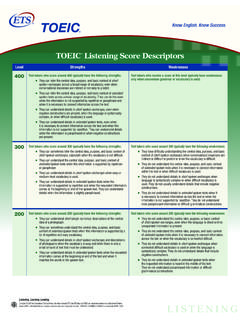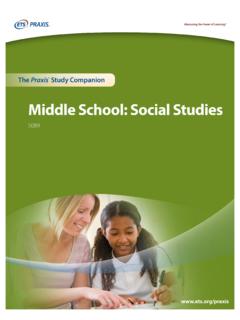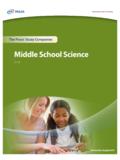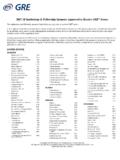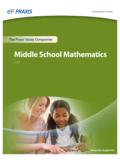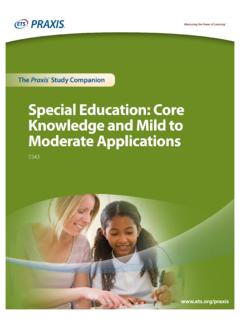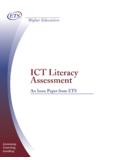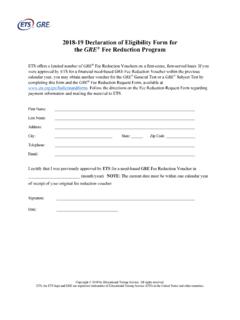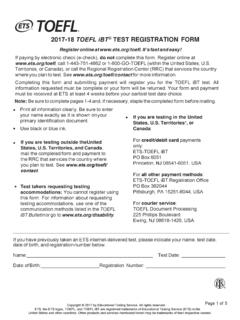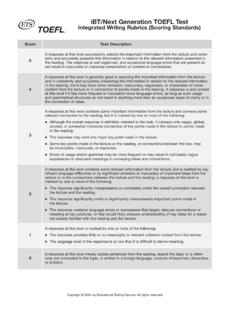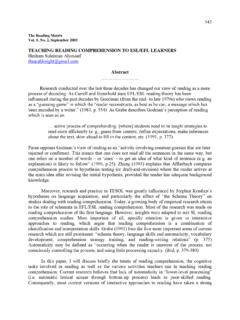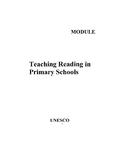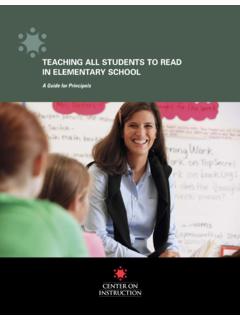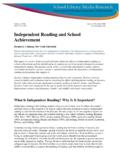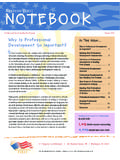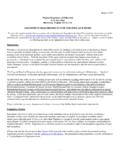Transcription of Core Academic Skills for Educators: Reading - ets.org
1 Core Academic Skills for Educators: Reading Praxis Study CompanionThe Praxis Study Companion2 Welcome to the Praxis Study CompanionWelcome to The Praxis Study Companion Prepare to Show What You KnowYou have been working to acquire the knowledge and Skills you need for your teaching career. Now you are ready to demonstrate your abilities by taking a Praxis test. Using the Praxis Study Companion is a smart way to prepare for the test so you can do your best on test day. This guide can help keep you on track and make the most efficient use of your study Study Companion contains practical information and helpful tools, including: An overview of the Praxis tests Specific information on the Praxis test you are taking A template study plan Study topics Practice questions and explanations of correct answers Test-taking tips and strategies Frequently asked questions Links to more detailed informationSo where should you start?
2 Begin by reviewing this guide in its entirety and note those sections that you need to revisit. Then you can create your own personalized study plan and schedule based on your individual needs and how much time you have before test in mind that study habits are individual. There are many different ways to successfully prepare for your test. Some people study better on their own, while others prefer a group dynamic. You may have more energy early in the day, but another test taker may concentrate better in the evening. So use this guide to develop the approach that works best for teaching career begins with preparation. Good luck!Know What to ExpectWhich tests should I take? Each state or agency that uses the Praxis tests sets its own requirements for which test or tests you must take for the teaching area you wish to you register for a test, confirm your state or agency s testing requirements at are the Praxis tests given?
3 Praxis tests are given on computer. Other formats are available for test takers approved for accommodations (see page 45).The Praxis Study Companion3 Welcome to the Praxis Study Companion3 Welcome to the Praxis Study CompanionWhat should I expect when taking the test on computer?When taking the test on computer, you can expect to be asked to provide proper identification at the test center. Once admitted, you will be given the opportunity to learn how the computer interface works (how to answer questions, how to skip questions, how to go back to questions you skipped, etc.) before the testing time begins. Watch the What to Expect on Test Day video to see what the experience is and when are the Praxis tests offered?You can select the test center that is most convenient for you. The Praxis tests are administered through an international network of test centers, which includes Prometric Testing Centers, some universities, and other locations throughout the schedules may differ, so see the Praxis web site for more detailed test registration information at The Praxis Study Companion4 Table of ContentsTable of ContentsThe Praxis Study Companion guides you through the steps to success1.
4 Learn About Your Test ..5 Learn about the specific test you will be taking2. Familiarize Yourself with Test Questions ..7 Become comfortable with the types of questions you ll find on the Praxis tests3. Practice with Sample Test Questions ..11 Answer practice questions and find explanations for correct answers4. Determine Your Strategy for Success ..20 Set clear goals and deadlines so your test preparation is focused and efficient5. Develop Your Study Plan ..23 Develop a personalized study plan and schedule6. Review Study Topics ..27 Review study topics with questions for discussion7. Review Smart Tips for Success ..43 Follow test-taking tips developed by experts8. Check on Testing Accommodations ..45 See if you qualify for accommodations that may make it easier to take the Praxis test9. Do Your Best on Test Day ..46 Get ready for test day so you will be calm and confident10.
5 Understand Your Scores ..48 Understand how tests are scored and how to interpret your test scoresAppendix: Other Questions You May Have ..50 The Praxis Study Companion5 Step 1: Learn About Your Test1. Learn About Your TestLearn about the specific test you will be takingCore Academic Skills for Educators: Reading (5712)Test at a GlanceTest Name Core Academic Skills for Educators: ReadingTest Code 5712 Time 85 minutesNumber of Questions 56 selected-response questionsFormat Selected-response questions based on Reading passages and statementsTest Delivery Computer delivered Approximate Approximate Content Categories Number of Percentage of Questions* Examination I. Key Ideas and Details 17 22 35% II. Craft, Structure, and Language Skills 14 19 30% III.
6 Integration of Knowledge and Ideas 17 22 35%* Includes both scored and unscored (pretest) questions. Depending on the number of pretest questions included in each scoring category, the total number of questions in that category may vary from one form of the test to another. IIIIIIA bout This TestThe Core Academic Skills for Educators Test in Reading measures Academic Skills in Reading needed to prepare successfully for a career in education. All Skills assessed have been identified as needed for college and career readiness, in alignment with the Common Core State Standards for Reading . In particular, there is an emphasis on Skills that are critical to learning and achievement in teacher preparation programs. These Skills include the ability to understand, analyze, and evaluate texts of different kinds. Varying in difficulty, the Reading material on the test is drawn from a variety of subject areas and real-life situations that educated adults are likely to encounter.
7 Each passage is followed by questions that are based on its content and that relate to Reading Skills . All questions can be answered by using information contained within the passage; no question requires outside knowledge of the test consists of four types of stimulus material: paired passages totaling approximately 200 words followed by four to seven questions, long passages of approximately 200 words with four to seven questions, short passages of approximately 100 words with two or three questions, and brief statements followed by a single question. Passages are drawn from both print and electronic media, such as newspapers, magazines, journals, nonfiction books, novels, online articles, and visual representations ( , diagrams, charts, drawings, maps, floor plans, or graphs). Questions in each of the formats may pose tasks of varying difficulty and test any of the Skills identified in the Topics Covered test may contain questions that will not count toward your Praxis Study Companion6 Step 1: Learn About Your TestTest SpecificationsTest specifications in this chapter describe the knowledge and Skills measured by the test.
8 Study topics to help you prepare to answer test questions can be found on page Key Ideas and DetailsA. Read closely to determine what a text says explicitly and to make logical inferences from it; connect insights gained from specific details to an understanding of the text as a whole; attend to important distinctions the author makes and to any gaps or inconsistencies in the account; determine where the text leaves matters uncertain1. Draw inferences and implications from the directly stated content of a Reading selectionB. Determine central ideas or themes of a text and analyze their development; identify accurate summaries of key supporting details and ideas1. Identify summaries or paraphrases of the main idea or primary purpose of a Reading selection2. Identify summaries or paraphrases of the supporting ideas and specific details in a Reading selectionC. Identify how and why individuals, events, or ideas interact within a text; determine how an idea or detail informs an author s argumentII.
9 Craft, Structure, and Language SkillsA. Interpret words and phrases as they are used in a text and recognize how specific word choices shape meaning or tone 1. Determine the author s attitude toward material discussed in a Reading selectionB. Analyze the structure of a text, including how specific parts of a text relate to each other and to the whole to contribute to meaning 1. Identify key transition words and phrases in a Reading selection and how they are used2. Identify how a Reading selection is organized in terms of cause/effect, compare/contrast, problem/solution, Assess how point of view or purpose shapes the content and style of a text 1. Determine the role that an idea, reference, or piece of information plays in an author s discussion or argumentD. Apply knowledge of language to understand how language functions in different contexts and to comprehend more fully when Reading 1.
10 Determine whether information presented in a Reading selection is presented as fact or opinionE. Determine the meaning of unknown and multiple-meaning words and phrases by using context clues1. Identify the meanings of words as they are used in the context of a Reading selectionF. Understand figurative language and nuances in word meaningsG. Understand a range of words and phrases sufficient for Reading at the college and career readiness levelIII. Integration of Knowledge and IdeasA. Analyze content presented in diverse media and formats, including visually and quantitatively, as well as in words1. Answer questions about texts that include visual representationsB. Identify and evaluate the argument and specific claims in a text, including the validity of the reasoning as well as the relevance and sufficiency of the evidence 1. Identify the relationship among ideas presented in a Reading selection2.
